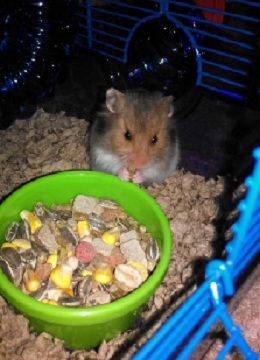 The newest member of the Youth Workin’ It Team’s family joined us on December 24th. No, not that kind of addition. We got a new hamster and her name is Cookie Sprinkles (don’t ask). We’re previous hamster owners and decided it was time to have something cute and cuddly in our lives once again.
The newest member of the Youth Workin’ It Team’s family joined us on December 24th. No, not that kind of addition. We got a new hamster and her name is Cookie Sprinkles (don’t ask). We’re previous hamster owners and decided it was time to have something cute and cuddly in our lives once again.
Despite being seasoned hamster owners, there have been some new things that have come up that we weren’t expecting.
That got me thinking: how is owning a hamster like being a youth worker? So in the vein of ‘All I Really Need To Know I Learned in Kindergarten‘, here are some lessons learned about youth work from hamster ownership.
1. Creating blockades
Hamsters sometimes barricade their tubes with shavings so nothing can get in. Unfortunately it also means that the hamster can’t get out, so they’re cut off from any connection to the people, their exercise wheel, even their food and water. They just sit there in their little barricaded space, hoping you’re going to free them. And even when you do, there’s no guarantee they won’t barricade themselves once again.
Youth can be the same way. They make choices that cut them off. Sometimes it’s emotionally, physically or spiritually. Other times, it’s from their friends, parents or you.
You may need to help them get unstuck, only to find they’ve done it again in six months. But what can you do – just let them languish out on their own? No. You do what you can to help, by providing support and a listening ear so that they don’t feel cut off and are able to reconnect.
2. Freedom with boundaries
Most hamsters LOVE to play in their little plastic balls. You place them in (taping up the top so it doesn’t pop open – learned that with hammy #1 the hard way) and let them go. They run all over the house in the safety of their little ball.
It’s safe for you – your house doesn’t get nibbled and defecated on in hard to reach places. It’s also safe for them – they don’t get stepped on, lost or electrocuted from the nibbling the wrong wire.
Youth need space. They need room to be creative and make mistakes. But often in today’s culture, the idea is that youth just need to experience everything without any boundaries and they’ll just learn the lessons they need to. Unfortunately, some mistakes are a lot harder to undo or come back from than others.
One night with a bit to drink and a joint can end up with a youth doing 7 years for grievous bodily harm after landing a boy in a coma and then a mentally disabled state for the rest of his life. Take the time to set up boundaries for your youth, but also give them opportunities for small mistakes in a safe environment. That way, you can make them teachable moments to help them avoid ‘nibbling the wrong wires’ in their lives.
3. Sometimes it just stinks, otherwise known as ‘poop happens’
Hamsters are wonderful pets and if you keep up with their cage, they’re very good self-groomers and it’s unlikely that you’ll have too much mess.
However, sometimes hamsters are just stinky, especially if they get sick. And they kinda just ‘go’ wherever and whenever they want. In their house… in their ball… on your hand… (another lesson learned the hard way).
Youth will make mistakes. Sometimes working with them – as much as you love them – can stink. They’re going to make choices you wish you could stop them from making. They’re going to make messes (hopefully not in your hand though!) and you’re going to be tempted to clean it up.
Sometimes a little cleanup can be appropriate, but sometimes you just have to figuratively (or literally depending on what kind of trouble they’re in) hand them a broom. Give them the tools to clean up their own messes and learn from their mistakes.
Question: What lessons have you learned from pet ownership that might help you or others in their youth work? Share your thoughts in the comments below
You can also connect with us by:
- Signing up to receive our posts via email
- Following us on Twitter
- Liking us on Facebook
- Signing up to our RSS feed